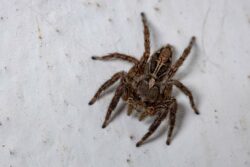If you’ve ever spotted a dark-colored pest with many legs darting across the floor, it’s only natural to grab your phone and start scouring for Florida bug identification resources. More often than not, however, these creepy crawlers are likely some common type of Florida house spider.
Even if you’re not afraid to squash a rogue spider in your home, you should be familiar with common Florida spiders. In addition to harmless spiders like daddy longlegs or jumping spiders, you may have more dangerous spiders lurking under your bed.
Before you clean out your closets, purge the storage under your bed, or sweep up webs in your garage, learn about common spiders you may encounter in Florida with McCall Pest & Wildlife. Have an immediate concern regarding spiders? Contact our Florida pest professionals today!
1. Wolf Spiders
Many common bugs in Florida are scary-looking, but wolf spiders give them a run for their money. They’re actually pretty mild-mannered, and on the rare occasion that they do bite, they don’t cause serious harm. Wolf spiders hide underground or under lawn debris and have dark, hair-covered bodies, measuring up to 35 millimeters in size.
2. Spiny-backed Orb Weavers
Spiny-backed orb weavers are peculiar spiders you may spot in your garden. Females are quite colorful, but their smaller male counterparts are duller-looking and lack the females’ pointed spines. Sporting shell-like bodies, these crab-shaped arachnids are neither aggressive nor dangerous.
3. Southern House Spiders
These common spiders can be found in dark nooks and crannies around your home. The charcoal-gray females measure less than an inch long; males are brown-toned and are often about half the size of females.
Male southern house spiders are sometimes mistaken for brown recluse spiders. Southern house spiders rarely bite. When they do, the worst result is likely to be irritation at the bite site.
4. Cellar Spider
As a Florida resident, you’ve probably seen these yellow-brown spiders with spindly legs creeping around the dark, cool corners of your garage, shed, or crawlspace. Similar in appearance to daddy longlegs, cellar spiders do not bite people. They also hunt small pests like gnats and ants around your home.
5. Banana Spiders
The body alone of this eye-catching spider is up to two inches long, not counting its legs. Not surprisingly, its web can measure a whopping three feet wide. Females’ spots are yellow against a tan or orange background; males are dark-brown and of a less impressive size.
Banana spiders are shy, but their bite does cause redness, blisters, and pain. Allergic reactions can cause respiratory issues and muscle cramping.
6. Yellow Garden Spiders
Yellow garden spiders spin circular webs in garden areas with help from an extra, third claw. Females boast vibrant yellow spots against a black backdrop; males sport less yellow on their top abdomens. Their venom may stop unlucky household bugs dead in their tracks, but it won’t harm you or your family.
7. Daddy Longlegs
“Daddy longlegs” is the term used to describe a group of multiple spider species. Daddy longlegs have small, round bodies and exceedingly long and spindly legs.
They do not spin webs, and typically hide in attics, crawlspaces, and other quiet, dark areas away from human activity. While they’re bizarre-looking, daddy longlegs spiders are not dangerous to people, and actually function as natural pest controllers in Florida homes.
8. Brown Widow Spiders
Brown widow spiders are an invasive species that have become increasingly common throughout the Gulf Coast. They have black and yellow banded legs, dark-colored heads, and abdomens with dark, blotchy markings. Despite their name, brown widow spiders are not as deadly as their black widow spider cousins.
If you’re bitten by a brown widow spider, it is painful but not as deadly as a black widow spider bite. Any time a spider bites you, however, monitor your symptoms and contact medical professionals if you have any concerns.
9. Black Widow Spiders
Black widows are more common than many Floridians realize. That’s because you can play host to these small, black, scarlet-stomached spiders without even knowing it. Their webs lack patterns, and they hide out in sheds, basements, and other dark places.
While their venom is quite dangerous, bites are uncommon due to the black widow’s skittish nature. Of course, you should contact pest professionals whenever you find a black widow spider in your home.
10. Brown Recluse Spiders
Like black widows, brown recluse spiders aren’t particularly social. They choose out-of-the-way places in homes, preferring to avoid any kind of interaction. That’s a good thing; their bite requires immediate medical attention. Not sure how to spot these elusive spiders? The brown recluse bears a dark, violin-shaped marking on its abdomen.
Solve Your Spider Issue with McCall Pest & Wildlife’s Pest Control Solutions
Like other household bugs in Florida, you never want to get too close in an attempt to identify them. Many Florida spiders, such as brown recluses and black widows, can inflict painful, venom-filled bites when they feel threatened.
When you have too many spiders in your Florida home, contact McCall Pest & Wildlife. We serve several Florida communities, including Jacksonville, Tampa, Tallahassee, and more.
Once we’ve inspected and assessed the spider situation in your home, we’ll work with you to create a comprehensive spider control and prevention solution. Request your free quote for Florida spider control from McCall Pest & Wildlife today!


